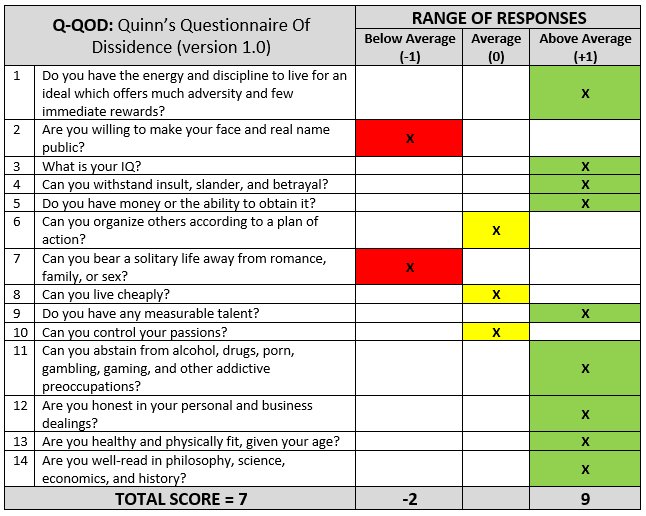Do You Have What It Takes to be a Dissident?
Posted By Spencer J. Quinn On In North American New Right | Comments DisabledThe easiest thing a dissident can do is screw up. When choosing this dangerous path, a dissident faces numerous obstacles and pitfalls and becomes an easy target for his well-funded and organized enemies.
Dissidents are, in a way, intellectual outlaws. Despite not breaking any laws — or even threatening to break any laws — a dissident loses the faith and protection of his government for the existential threat he poses. He is no longer innocent until proven guilty. He no longer has rights given to him by God. He endures a hailstorm of insults and slander. He becomes ostracized and unemployable. He is forbidden common means of publication, communication, and raising money. In many cases, he is harassed either by his government or by criminal partisans whom the government refuses to prosecute. And any mistake he makes will be pounced upon by enemy media and used against him.
This is the contract. This is what the dissident signs up for. This is the price he pays when he values his convictions over his livelihood and his future.
So it is a thin line over the abyss. Falling off of it would be easy — just one wrong step is all it would take. I can imagine some dissidents succumbing to the stress and sacrifice and actually wanting to fall. They just crack up and demand freedoms they long ago renounced, and then take one proud step into oblivion. To paraphrase Greg Johnson, if they are going to be losers, they might as well be beautiful losers as they plummet all the way to Valhalla. It sure beats the humiliation of crawling back along that thin line and admitting defeat.
This is why I am not a dissident. This is why I remain a pseudonymous author who merely writes about dissidence from the comfy confines of his kitchen. Do I have what it takes to be a dissident? I don’t know, and while I have things to do in my normie life, I’d rather not find out just yet.
Knowing all of this, however, will assist young people with the decisions they will have to make if they are considering becoming dissidents themselves. The road is thin, hard, lonely, and hazardous. It is policed by some of the world’s most powerful people, and travelers are liable to get ambushed or lost, if they don’t lose heart altogether. It is not to be embarked upon lightly.
It takes a person of certain character and means to become a successful dissident. To that end, I have come up with a list of fourteen questions aimed to tease out the dissident’s essential qualities. It produces a cumulative score based on three possible answers and their mathematical values: below average (-1), average (0), and above average (+1).
Call it the Q-QOD (pronounced “Cue-Quad”): Quinn’s Questionnaire Of Dissidence, which I have filled out for myself:
I imagine a score of 10 or higher would make one suitable dissident material (my relatively low score of 7 places me out of that elite group). According to the Q-QOD, if you’re below average in three or more categories, you’re sunk as far as dissidents go no matter how well you score on the others. Also, these scores are not immutable and can change as a person changes throughout life. I imagine that our most experienced and well-known dissidents today — Greg Johnson, Jared Taylor, Kevin MacDonald, Mark Collett, and David Duke, among others — would all score at least a 12 on this questionnaire.
 [3]
[3]You can buy Spencer J. Quinn’s young adult novel The No College Club here [4].
How well do you score? Hopefully, you will let us know in the comments. And if the questionnaire can be improved, please share your ideas in the comments as well.
The purpose of this is to make explicit what a person is signing up for before embarking on a life of dissidence. It’s a hard road — and there is nothing more destructive to oneself and to the movement than when a dissident screws up. In most cases, I would argue, screwing up results from a rapid reduction in one’s Q-QOD score.
Say, for example, a dissident is interviewed by enemy media so as to discredit a rival dissident. That counts as a reduction in Question 1’s score. Suppose a dissident doxxes a fellow dissident in retaliation for undermining his political campaign. This would be a reduction in Question 4. Suppose a dissident publishes an angry, unhinged rant because he’s frustrated about his lack of a love life. That would be a reduction in Question 7. Suppose a dissident appropriates funds meant for the movement in order to pay off gambling debts, subsidize a drug addiction, or support a lavish lifestyle. This would reduce the score in any number of questions in the Q-QOD.
You see where I am going with this, don’t you?
The Q-QOD offers a handy metric not only for determining who should be a dissident, but also for determining whether a dissident should remain a dissident. A dissident who suddenly scores below a 10 on the Q-QOD will likely become more of an impediment to the movement than an asset. Again, screwing up is easy to do. We all do it. We’re all human. The problem is that dissidents have especially difficult lives because their enemies make it especially easy for them to screw up. And so much is riding on them not to screw up. It’s not fair. And I am sure it hurts. But the fact remains that without dedicated dissidents, any political movement is bound to fail. Thus, followers and patrons of a movement have no choice but trust their dissidents not to screw up.
In many cases, I am sure, a quiet retirement would be preferable to a dissident’s going down in flames all the way to Valhalla. He may not realize it, but every time that happens, he’s liable to take a number of his followers — and possibly even the entire movement — down with him.
* * *
Counter-Currents has extended special privileges to those who donate $120 or more per year.
- First, donor comments will appear immediately instead of waiting in a moderation queue. (People who abuse this privilege will lose it.)
- Second, donors will have immediate access to all Counter-Currents posts. Non-donors will find that one post a day, five posts a week will be behind a “Paywall” and will be available to the general public after 30 days.
- Third, Paywall members have the ability to edit their comments.
- Fourth, Paywall members can “commission” a yearly article from Counter-Currents. Just send a question that you’d like to have discussed to [email protected] [5]. (Obviously, the topics must be suitable to Counter-Currents and its broader project, as well as the interests and expertise of our writers.)
To get full access to all content behind the paywall, sign up here:
Paywall Gift Subscriptions
 [6]If you are already behind the paywall and want to share the benefits, Counter-Currents also offers paywall gift subscriptions. We need just five things from you:
[6]If you are already behind the paywall and want to share the benefits, Counter-Currents also offers paywall gift subscriptions. We need just five things from you:
- your payment
- the recipient’s name
- the recipient’s email address
- your name
- your email address
To register, just fill out this form and we will walk you through the payment and registration process. There are a number of different payment options.

